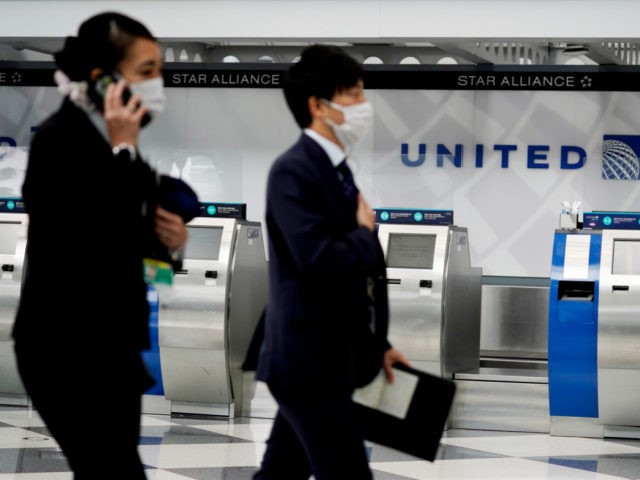A three-judge panel in a federal appeals court heard arguments Monday evening in a lawsuit against United Airlines regarding the company’s coronavirus vaccine mandate.
The lawsuit, which was originally filed by six United Airlines employees in September, alleges that the company violated Title VII of the Civil Rights Act of 1964 and the Americans with Disabilities Act (ADA) by discriminating against them based on their religious beliefs and medical conditions. As a “reasonable accommodation” for these beliefs and conditions, United has placed around 2,000 employees on unpaid leave for foregoing vaccination. Those employees have also been stripped of their health benefits and many are the subject of a non-compete clause.
A panel for the U.S. Court of Appeals for the Fifth Circuit, comprised of President Donald Trump appointee Andy Oldham, Ronald Reagan appointee Jerry Smith, and George W. Bush appointee Jennifer Elrod, will ultimately have to decide whether United employees face irreparable harm and are in need of a preliminary injunction to preserve the status quo while litigation continues. The Fifth Circuit, which is widely considered the most conservative appeals court, rejected an emergency request to halt the mandate in mid-December, but granted a motion to expedite an appeal in the case after a district judge refused to grant an injunction.
Hearing Highlights
Plaintiffs’ lawyer, Gene Schaerr of D.C. law firm Schaerr Jaffe, argued that United’s mandate uses coercion to make its employees choose between “the jab and the job,” and that doing so causes irreparable harm because vaccination cannot be undone and because it creates a crisis of conscience. He emphasized that many employees do not want to be “complicit in the destruction of human life,” as an abortion-derived cell line was used to lab test and/or develop most coronavirus vaccines.
“This legal question is important because if what United is doing is not irreparable injury, a company can likely escape all accountability for having violated its employees’ rights,” Schaerr said during arguments.
The panel seemed more favorable to United’s employees 2-1. Elrod and Oldham asked more probing and sympathetic questions that would benefit United’s unvaccinated employees, while Smith, a libertarian, did not seem to think employees have a solid case.
“I don’t think you’ve exhausted [the process of seeking relief from the EEOC], and I think that’s fatal to you,” Smith said, noting that he did not foresee a likelihood of success on the merits.
Schaerr replied by quoting an opinion from District Court Judge Mark Pittman, who said the “arguments appear compelling and convincing at this stage.” Pittman, a Trump appointee, also criticized United’s “calloused approach” and said its mandate reflects “apathy.”
“Yeah, he threw in some cheap shots — there’s no doubt about it,” Smith said of Pittman’s opinion. “He said he was dwelling only on the irreparable harm, and then he managed to try and poison the well as best he could.”
“I think he wanted to convey to the world that our claims have merit,” Schaerr replied.
During United’s argument, Elrod contended that “most people cannot wait it out for a year” on unpaid leave, to which lawyer Hashim Mooppan conceded. However, he argued that most Title VII plaintiffs face that possibility.
“Maybe there should be a distinction for accommodation cases where it’s not after the person has been fired, it’s perspective accommodation cases,” Elrod replied.
The judge also called out United Airlines for allowing potentially unvaccinated London staff to mingle with vaccinated American staff.
“With respect to foreign employees, there are separate foreign laws that we have to comply with — it doesn’t make it a non-neutral policy that we have to comply with other countries,” Mooppan responded. Elrod continued:
But it shows that it’s not an undue hardship to be working with people who are not vaccinated doesn’t it? …If you have a work pool with some people who are and some people who aren’t, the argument that you’re actually accomplishing anything — the argument goes down doesn’t it?
Mooppan did not reply any further to that line of questioning.
During United’s argument, Oldham said the case is the first he has seen of its kind that has a “conscience angle to it” and told Mooppan that court precedent holds that indefinite unpaid leave is an adverse employment action. He also took time to further clarify United employee’s claims.:
The argument is: it’s not that they don’t have to show irreparable injury, it’s that the injuries they’re suffering are two. They’re suffering one injury from being on unpaid leave indefinitely, and they’re suffering a second injury because they’re put through the crisis of conscience in choosing their fate.
“I don’t see why the court can’t use the equitable power of an injunction to stop it,” he concluded.
Schaerr, in closing argument, said there will not be a trial until the Equal Employment Opportunity Commission (EEOC) grants employees the right to pursue the lawsuit. The judges did not say when they will rule on the appeal.
The case is Sambrano v. United Airlines, No. 21-11159 in the U.S. Court of Appeals for the Fifth Circuit.
Katherine Hamilton is a political reporter for Breitbart News. You can follow her on Twitter.

COMMENTS
Please let us know if you're having issues with commenting.